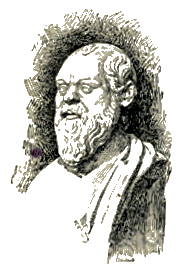Story of the Greeks - Helene Guerber |
The Philosopher Socrates
When Pericles died, the Peloponnesian War had already been carried on for more than three years, but was not nearly at an end. As the Athenians felt the need of a leader, they soon chose Nicias to take the place left vacant by Pericles.
This Nicias was an honest man; but he was unfortunately rather dull, and very slow about deciding anything. Whenever he was called upon to see to matters of state, he hesitated so long, and was so uncertain, that the Greeks often had cause to regret the loss of Pericles.
There was another man of note in Athens at this time, the philosopher Socrates, a truly wise and good man. He was no politician, however; and, instead of troubling himself about the state, he spent all his spare moments in studying, or in teaching the young men of Athens.
Like his friend Anaxagoras, Socrates was a very deep thinker. He, too, always tried to find out the exact truth about everything. He was specially anxious to know how the earth had been created, who the Being was who gave us life, and whether the soul died with the body, or continued to live after the body had fallen into dust.
Socrates was a poor man, a stonecutter by trade; but he spent every moment he could spare from his work in thinking, studying, and questioning others. Little by little, in spite of the contrary opinion of his fellow-citizens, he began to understand that the stories of the Greek gods and goddesses could not be true.
He thought that there must surely be a God far greater than they,—a God who was good and powerful and just, who governed the world he had created, and who rewarded the virtuous and punished the wicked.
 Socrates. |
Socrates believed that everybody should be as good and gentle as possible, and freely forgive all injuries. This belief was very different from that of all ancient nations, who, on the contrary, thought that they should try to avenge every insult, and return evil for evil.
The philosopher Socrates not only taught this gentleness, but practiced it carefully at home and abroad. He had plenty of opportunity to make use of it; for he had such a cross wife, that her name, Xanthippe, is still used to describe a scolding and bad-tempered woman.
Whenever Xanthippe was angry, she used to scold poor Socrates soundly. He always listened without flying into a passion, or even answering her; and when her temper was too unbearable, he quietly left the house, and went about his business elsewhere.
This gentleness and meekness only angered Xanthippe the more; and one day, when he was escaping as usual, she caught up a jug full of water and poured it over his head.
Socrates good-naturedly shook off the water, smiled, and merely remarked to his companions, "After the thunder comes the rain."